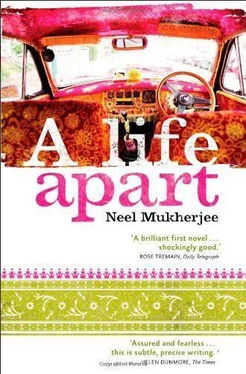The men gain in on her and before she has had a chance to look up, or hold out her hand in fragile defence, in protest, the lathi blows fall on her thickly, with a dull thwacking sound against her layers of clothing. She cowers and covers her head, cringing and squirming in the mud. She cannot see anything except moving feet, dark, dirty, shod in rubber sandals. She cries out in pain, in the vain hope that someone can hear her. And just as suddenly they had arrived, they disappear, running off across the field, shouting bande mataram, bande mataram . We hail thee, mother goddess. After that, Miss Gilby doesn’t remember anything.
Zafar says, ‘I’ll be back in half an hour. Just a quick drink at the bar. Let’s see what he wants. You stay here, OK? I’ll be back soon.’
Ritwik nods and watches him leave. An unexpected telephone call from one of his clients, he said; surprising that he should have come to the hotel within half an hour of the call, requesting to see Zafar, rather than let it wait until tomorrow. Must be something urgent, Zafar had said, although he added that he had no idea what it could be.
Ritwik counts one hundred, careful to space the numbers out equally, not rushing them, especially towards the end, and then leaps out of the sofa and goes to the table on which Zafar’s briefcase, papers, laptop, filofax all lie in crowded confusion. There is no point in looking at the computer; he doesn’t have a clue what to do with it, where to look. Besides, he might do something, in his ignorance, which will make it obvious that he has been snooping.
The filofax gives nothing away. There are a lot more entries in Arabic than he expected but then he forgets most of the time that Zafar is Arab. The English entries do not yield up their secrets either. Some names are followed by what appears to be clearly a name for a company or an institution: John Grimble, Fender Care Naval Solutions; Jonathan Pacitto, AgustaWestland; Al Lilley, Accuracy International; Randeep Modi, William Cook Defence; Simon Newton, LM UKIS Ltd. Ordinary names, ordinary addresses, ordinary phone numbers, all unrevealing and silent. He puts back the filofax exactly where he picked it up from and looks through the papers, first gingerly, turning up corners and edges, then more boldly, lifting them up, leafing through them. Latest newsletter from British Aerospace Ltd. A thick tome: SBAC Chain Directory . Society of British Aerospace Companies. A folded printout, like a giant compressed Japanese fan, of the SBAC ‘Members’ Capability Matrix’. It is a beautiful thing, with randomly positioned red and blue dots and, here and there, ticks, an Arab character or two, a ‘yes’, a few crosses, dispersed across the unfolding concertina. Donna Tartt, The Secret History . His attention is held by the spanking-new hardback: the blurb intrigues him and he makes a mental note to buy it, now that he can afford such luxuries. Zafar has dog-eared the page to mark the point where he has stopped reading. There is an official-looking letter from the Defence Manufacturers’ Association talking of strategic consultancies, cost-related improved efficiency, a forthcoming calendar of events, invitation to members’ meetings. Ritwik has to read each sentence a few times over to understand the purpose and meaning behind the unfamiliar jargon. By the time he reaches the invitation to the Defence Systems and Equipment International Exhibition, he is so bored — and a tiny bit guilty about intruding shamelessly like this — that he is ready to take a catnap. Something in the invitation letter catches his eye and he reads it carefully to pin it down. In a minute he has it — both the date and the word ‘Gloucestershire’. 13–15 May, Lydney, Gloucestershire. Today is the 12th.
A solid find at last, the secret of Zafar’s disappearance to Gloucestershire, but it comes as an anticlimax and the boredom floods back in again. The ringing phone makes him start: he cannot make up his mind whether to pick it up, whether he should, and by the time he has decided not to, it stops. A minute later, it rings again; he picks it up. It is Zafar.
‘Look, I have to go somewhere. Something’s come up. You can stay here but I shall be back very late. Or I can get them to call a taxi for you to take you home.’
‘I think I should go home.’
‘OK, come down to reception in, say, twenty minutes? They’ll have a cab waiting for you.’
‘OK.’ He is expecting something else, a brief goodbye, a ‘see you later’, or ‘I’ll call you when I get back from Gloucestershire.’ Instead, there is the curt click of Zafar hanging up.
Montu enters the drawing room and announces that the car is ready and the boxes and trunks have been loaded. Mr Roy Chowdhury nods in acknowledgement and asks him to wait outside. His eyes are red-rimmed and small, he clasps his two hands together under his shawl to hide their stubborn shaking. Bimala hasn’t stopped crying for the last week; now that Miss Gilby is really going away forever, now that it is no longer a faint possibility in the dim future but in the here and now, and happening right under her eyes with the truculence and irreversible tyranny of the present tense, she is inconsolable. She has given away all her books on Indian birds to her. On the fly-leaf of each she has inscribed in her childish hand, using her characteristic rounded and perfectly formed English letters, TO MISS GILBY MY TEACHER, FRIEND AND COMPANION, WITH MY LOVE. And below that, in cursive, ‘Please do not go away.’ Miss Gilby hasn’t opened the books since the day she was given them.
The bandages around her head are still there, although now it is more of a bandage than heavy headgear. She still needs her stick to walk. She tries to get up; Mr Roy Chowdhury and Bimala are immediately at her side, trying to support her gently. She tries to concentrate on little, irrelevant things — the thin blue border of Bimala’s sari , the terracotta horses from Bankura, which sit in the four corners of the room, the silver-tipped end of her walking stick that belonged to Mr Roy Chowdhury’s brother. Her lips are pressed into a nearly invisible line. Judging by the copiousness of her weeping, Bimala is the one who needs support, she thinks.
She doesn’t remember if she has spoken to them at all this morning. She opens her mouth to console Bimala but she can’t think of anything appropriate to say, so she remains silent.
Montu toots the car horn. Shuffling and hobbling, she gets into the car, helped by Bimala and Mr Roy Chowdhury. The courtyard is a blizzard of circling pigeons: Bimala’s naw jaa is scattering grains from behind the blinds. Only an occasional arm, disembodied, reaches out and the palm opens to fling down some rice.
Mr Roy Chowdhury gets into the car as well; he has insisted on accompanying Miss Gilby all the way to Calcutta, despite her protests.
Over the last week, Miss Gilby, foreseeing this moment, has talked herself into not looking out of the car window. She sits beside Mr Roy Chowdhury and busies herself with the difficulty of sitting in the back in her current state, with rugs, with finding a place for her walking stick. In the periphery of her vision, Bimala reaches out a hand towards the separating glass.
She remembers Mr Roy Chowdhury’s voice breaking on his last words, ever, to her. ‘Miss Gilby, I hope you will find it in your heart to forgive us.’
The meshes of the afternoon draw him in. He lies on the sofa looking at the sky framed by the window. Eventually, darkness falls like the sound of dew. The blinking lights of the aeroplanes traverse the windowpanes and he sometimes moves his head slightly to let the lights describe a perfect diagonal in the square of glass. At other times, he positions his head to have a line of those lights bisect two opposite sides of the square. There are occasions when two or three planes at a time crisscross against the dark panel of the sky. The geometric possibilities become endless, a whole bagatelle of distant lights remotely controlled from the darkness of the sitting room. Sometimes, Ugo sits on the windowsill, keeping an eye out for things. All lives have an onward flow, a beginning leading to a middle leading to an end; only his seems to be a swirling eddy in someone else’s flow, destined to whirl round and round for a brief while till a change in current or wave pattern obliterates it. For that brief while, every day is today.
Читать дальше












